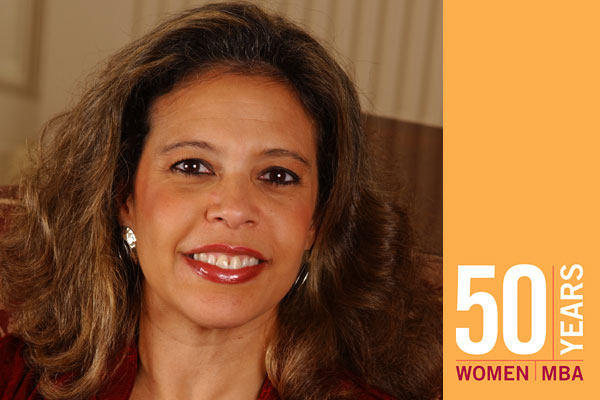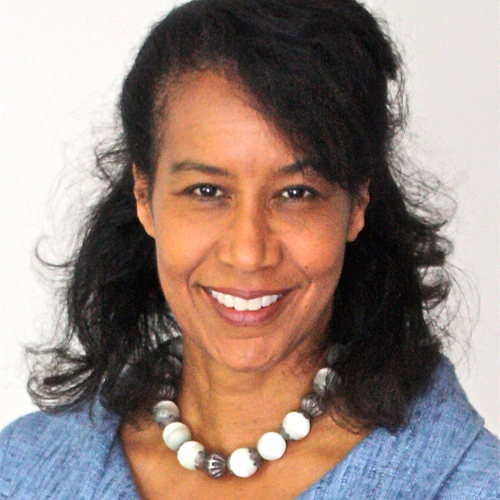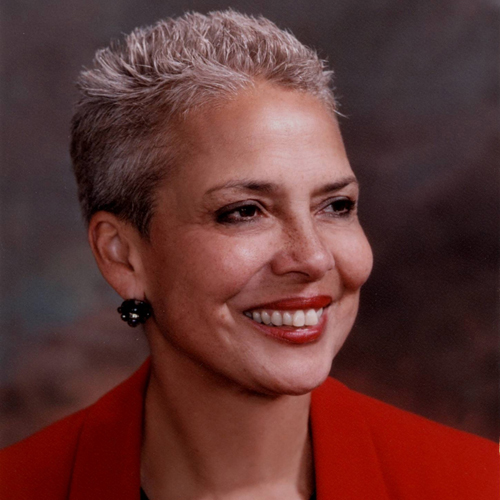
Adrienne Kelly-Lumpkin
Biography
After graduating from HBS in 1983, Adrienne Kelly Lumpkin worked for Hewlett-Packard Company in multiple marketing capacities and management for 10 years. In 1993, she co-founded Alternate Access, Inc. in Raleigh, North Carolina.
What impact did HBS have on your life and the life of others?
I was accepted to Harvard Business School while a senior at Wesleyan University. It was an unexpected and almost out-of-body experience. I recall that the envelope was thin, typically a bad sign, so I put it aside. I had already been accepted to three strong schools on the West Coast, and I had left my heart in San Francisco earlier that year, so I believed I was westward bound. Later that night, I decided, ‘what the heck’ and opened the envelope to learn I had been offered a deferred admission. The opportunity changed the orbit of my universe and was too compelling to refuse.
My decision to apply to business school was based on a combination of having spent a semester taking marketing and business courses at the University of San Francisco and a process of elimination—friends were going to law and med school and neither direction struck a chord for me. Business seemed broad enough to encompass whatever I might want to be when I ultimately grew up and had it figured out.
I came from humble-turned-middle-class beginnings. My dad was a New York City Police Officer in Harlem who moonlighted in a distribution warehouse; my mom was an elementary school teacher. Their years of hard work and long hours made it clear that all their daughters were to attend college. No question about that. I was a strong student academically, but neither my high school nor college academic success prepared me for the rigor or atmosphere of HBS.
I recall my amazement first year in realizing the breadth and depth of student experiences, in particular those who had lived or traveled outside of the United States. While I had my fair share of traveling within our continent and the Caribbean, the other continents were an enigma to me. Classmates seemed to pull from an array of experiences I had never had or imagined. In an attempt to be more connected to other students, I joined the Women’s Student Association as treasurer but I was unsuccessful in building a bond with the four Caucasian women who comprised the other officers. The women were cordial, but nothing more developed in terms of relationships. I felt out of place…racially, economically, sometimes even intellectually. It was a real disconnect for me.
A rather blatant example of my isolation that became a turning point happened in November of first year. We had an Organizational Behavior case in which the decision maker was an African American man. Our section had four black students or so and one of them, about a dozen years my senior, had been in contact with the professor to encourage him to have a black student open the case. That student turned out to be me. During the presentation of my analysis, the professor interrupted and asked me if I had ever worked for a black manager. I thought for a moment, and then candidly responded, ‘my dad.’ The room erupted in laughter…some of it, I realized later, nervous laughter. After class that day, a white classmate came up to me feigning brotherly concern and offered the advice that ‘given my light complexion, if I didn’t let on to people that I was black they wouldn’t know.’ He compared my being black to his having been adopted—‘no one knew, nor did they need to know.’ His implication was that my race was a shortcoming and disclosing it was to my disadvantage.
I was simultaneously outraged and hurt. I went home for Thanksgiving later that week and donned a visual protest by returning to Harvard with my hair in cornrows. I was black. I was comfortable in my own skin and would no longer be intimidated by the environment. From that moment, I began to assert myself and claim my own background and experiences as worthy to be in the room with the wealthy, well-traveled, and privileged.
In contrast to the disconnect I felt in the classroom, it was reassuring to feel I had the support of other African American students. Many second year students took on the role of mentor and coach for us newbies. They provided guidance and tips on managing the ‘three cases a night’ workload and as they interviewed and landed impressive job opportunities, it offered encouragement and excitement about the world beyond HBS.
Despite feeling out of place and over my head that first year, I gleaned a lot from my classmates, study groups and professors, and the dynamics of the classroom as a whole. Two concepts stick out most when I think of my Harvard experience.
- The first: There is no one right answer.
HBS taught me that there are many ways to skin a cat and to be more deliberate and conscious in selecting the appropriate solution for the time. I have become more creative in problem solving and a broader-thinking, better negotiator. I have honed the ability to see another’s point of view and to collaborate toward win-win solutions. This skill has served me well in both my corporate and entrepreneurship endeavors. And it serves me well in my current venture, too.
After my 10-year tenure at Hewlett-Packard in various marketing and management roles, I co-founded a technology company, serving as president and marketing director for 20 years. Today, Alternate Access offers hosted phone systems to businesses in North Carolina and many other states. Outside of the business, I have served on boards of professional organizations (Greater Raleigh Chamber of Commerce, National Black MBA Association and National Association of Women Business Owners) as well as nonprofit organizations such as Raleigh Little Theatre and the United Arts Council of Raleigh and Wake County. Throughout these two decades, I have volunteered in our public schools and over the last six years been involved in public education advocacy.
My passion and concern for public education led me to seek an encore career that fosters quality education and growth for all students. I currently serve as Chief Operating Officer for a nonprofit whose mission is to “surround students with a community of support, empowering them to stay in school and achieve in life.” My ability to bring much-needed business skills to the organization, take the long view, and create and improve processes is helping to lead the organization strategically as we grow from local and state funding to multi-year, federal funding and profitable revenue-generating programs.
- The second: Use my difference to navigate across a broad spectrum of people.
My parents instilled in me an appreciation of all types of people. I went to a high school of 1,200 students, where I was the only black student. During the same period, I attended an ‘all black’ church less than 3 miles away. My parents had friends of all ages and we hosted multiple exchange students from Ethiopia to Brazil. So I appreciated other people’s differences, but perhaps had not appreciated my own. My Harvard experience was the first step in that journey.
I suppose I can partially thank my section colleague for this second takeaway from HBS. His comment made me face and embrace the likelihood that I will continue to be in environments where I am a fish out of water. When I was running my telecom company, I was often the lone female and lone African American at networking events. When introduced with my partner, who happens to be my husband, it was generally assumed that I was an assistant of sorts, not the president of the company. I have been able to use this to my advantage at times, gleaning more information than might have been shared otherwise. (It’s amazing what people will tell you when they think you are not in charge or influential!)
After leaving HBS I really embraced my uniqueness and gained an appreciation for the insights I bring to a conversation, problem, organization, or entity. Finding a point of mutual interest and building upon that has served me well in my goal to serve others, be they customers, constituents or stakeholders in one of my volunteer pursuits. Shifting to the nonprofit world has put me in yet another arena in which I am a little different from everyone else—more Northern, more highly educated, more profit-oriented. It’s a role in which there is mutual benefit and one which brings me closer to my goal to make a sustainable impact on public education in North Carolina.My advice to women, black women in particular, entering the halls of this iconic institution is to recognize that, like sudden wealth, Harvard Business School does not change you; it just exposes more of who you are. So it’s important to know who you are going in—know your strengths, your values, your interests, your weaknesses. Know what you bring to the table and be confident in expressing it to others.
I expect students entering the B-school now are older and more seasoned than I was as a recent college graduate and therefore bring a broader spectrum of knowledge and gravitas to the table. Still, I imagine it can feel intimidating to be surrounded by colleagues with tremendous potential who have achieved so much already. Know and love thyself is the most important advice I can share. And remember, there is not just one right answer…so speak up and share your insight and thoughts. Don’t lose the opportunity to get to know (I mean really know) your classmates (and professors), inside and outside the classroom. Find your point of connection and foster it. Build your circle and stay in touch. It will serve you well down the road.

